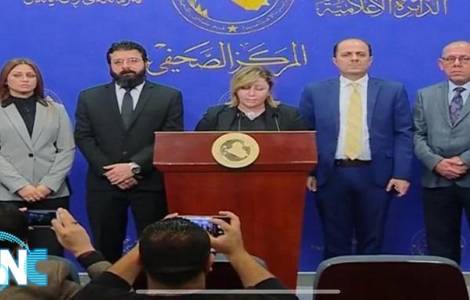
Mosul (Agenzia Fides) - The Bishops of the Churches present in Mosul and in the Nineveh Plain, in a striking initiative, have announced the possible boycott of the next rounds of elections by the Christian component of the Iraqi population, if the demands raised within this component and aimed at protecting the spaces of political representation guaranteed to Christian candidates in Parliament and in national and local political institutions by the same electoral laws currently in force are not taken into consideration.
The Bishops who make up the so-called ""Nineveh Council" expressed their concerns in a lengthy and articulate statement addressed in particular to the institutional representatives of the Iraqi Parliament.
At the center of the ecumenical body's initiative is the increasingly controversial issue of "quotas" of parliamentary seats reserved for minority members of the Iraqi population.
Iraq - reads the text signed by the Bishops - is characterized by its ethnic and religious plurality, which also includes the Christian component. The electoral law in force provides that five seats in Parliament are reserved for candidates belonging to the indigenous Christian communities, so that the needs of the Christian component find expression in the exercise of legislative power. But the vote to elect the candidates destined to occupy the seats reserved for the Christian component is not exercised exclusively by Christian voters. Even non-Christians can vote to assign the 5 seats that in theory should be reserved for the Christian component. In this way, the majority political forces are also able to pilot the allocation of seats reserved for minority components, including Christians. For this reason - reads the Bishops' statement - the candidates end up not really representing the legitimate demands and interests of the Iraqi Christian communities at a political level.
The concrete proposal outlined in the statement signed by the Bishops of the "Nineveh Council", who belong to different Churches, is to establish a Register of Christian voters and electors qualified to cast their votes to allocate the five parliamentary seats reserved for the Christian component. The establishment of such a register - the Bishops write - would be in full harmony with the Iraqi Constitution and Supreme Court pronouncements regarding electoral procedures. If, on the other hand, the legitimate requests coming from the indigenous Christian communities are not listened to, the children of the Christian component will find themselves faced with two possible choices: the first is "to demand the cancellation of the quota of seats reserved for them in the current electoral law", to prevent even those seats reserved for Christian candidates from being effectively occupied by people who do not effectively represent the needs of Iraq's Christian communities. Alternatively, if the call is made for the establishment of a specific electoral register, all that remains is the path of an electoral boycott.
The statement was signed by Dominican Najib Mikhael Moussa, Chaldean Archbishop of Musul, Mar Nicodemus Daoud Matti Sharaf, Syrian Orthodox Bishop of Mosul, Mar Isaac Yousif, Bishop of the Assyrian Church of the East, Mar Benedictos Younan Hano, Syrian Catholic Archbishop of Mosul, and Mar Chamoun Daniel, Bishop of the Ancient Church of the East.
After the legislative elections on October 10, 2021, as previously reported by Fides (see Fides, 21/10/2021), controversies and tensions had already emerged around the distribution and method of assigning seats reserved for Christian candidates. At the time, the most explicit objections to the results of the electoral round had come from former Christian MP Joseph Sliwa, who went so far as to declare that the five new MPs awarded seats in this quota do not represent Iraqi Christians, given that according to him 90% of the votes cast in their favor had not actually come from Christian voters.
The accusation, which already emerged during the 2018 Iraqi general elections, calls into question major political formations, of Shiite and Kurdish origin, which according to critics, in the last rounds of elections diverted a part of their votes to candidates running for seats reserved for Christians in order to place MPs in those seats who were totally aligned with their political strategies. In 2021, Sliwa's accusations had been answered by Evan Faeq Yakoub Jabro, a former minister for refugees and migration in the outgoing government led by Mustafa al Kadhimi, who was elected with nearly 11,000 preferences to the new parliament in the ranks of the "Babylon Movement," and who had defended the transparency of the electoral process.
In the 2021 elections, it was precisely the "Babylon Movement" that had won as many as 4 of the 5 seats reserved for Christian candidates by the national electoral
system (in the photo, the current MPs elected in the seats reserved for the Christian component).
The Babylon Movement emerged as a political projection of the so-called "Babylon Brigades," an armed militia formed in the context of the military operations against Islamic State (Daesh) jihadists that led to the reconquest of the northern Iraqi areas that had fallen into jihadist hands in 2014. Led by Ryan al Kildani (Ryan "the Chaldean"), the "Babylon Brigades" had always claimed their label as a militia composed of Christians, although their connection with pro-Iranian Shiite militias such as the Popular Protection Units (Hashd al Shaabi) was documented. The political acronym of the "Babylon Movement" is also considered to be close to the "Badr Organization," a political movement that in the elections had merged into the Fatah Alliance, a cartel grouping nine pro-Iranian Shiite acronyms and organizations. (GV) (Agenzia Fides, 30/3/2023)
 ASIA/LEBANON - General Abagnara (UNIFIL): “The Pope’s visit confirms us in our peacekeeping mission”
ASIA/LEBANON - General Abagnara (UNIFIL): “The Pope’s visit confirms us in our peacekeeping mission”